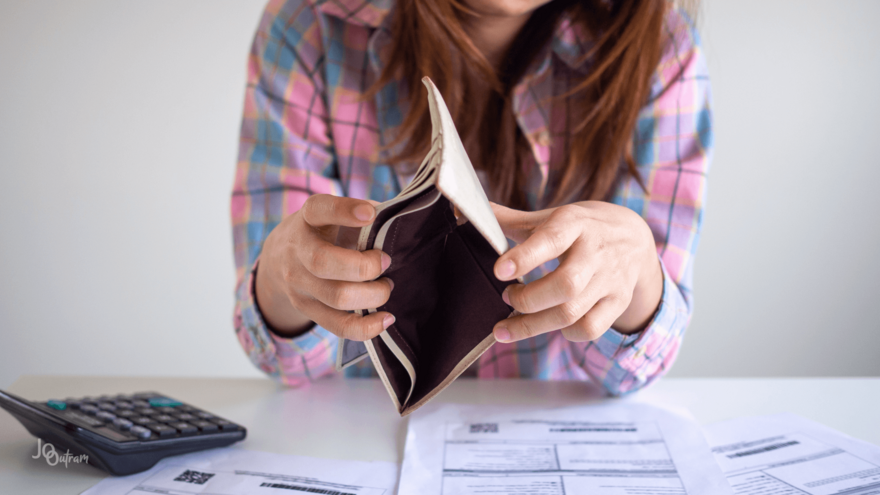5 Common Habits of People Who Stay Broke!

People who remain broke and continually live from pay-cheque to pay-cheque usually have a foundation of poor financial habits. Until they address these unhelpful habits, they will stay in the poverty cycle, no matter how much their income increases.
Here are the most common habits:
A Failure to Consistently Save Money
People who are consistently free of financial challenges have consistent saving habits. There’s always money available to handle the inevitable financial emergencies if you save part of your paycheck each time you get paid.
You can start to break this habit, by starting to save regularly. Even a small amount per month can help you form the habit. Choose your amount, one that won’t leave you destitute, and set up an automatic payment to transfer the amount into your savings account as soon as you are paid each month.
Not Having A Budget
Everyone needs a budget. It is just a way of setting financial limits so that you don’t overspend in some areas, resulting in you needing to cut back in others or, worse, using debt to cover the excess spending.
The main reason I hear as a money coach for not creating a budget is that it is too restrictive. Yet the only restrictions you have are your total amount available for spending (your income), and any fixed payments you have previously signed up to, such as the level of your mortgage or rent and any debt you need to repay. These restrictions already exist, but they are often ignored without a budget!
Excessive Spending
The more you spend, the less you have to save. It’s that simple. Spending too much money makes you vulnerable and more likely to have financial challenges. Very excessive spending leads to accumulating debt, which is the ultimate financial curse.
Take this next month to be consciously aware of where and when you spend your money. Before every purchase, ask yourself, “Do I really need this?”
Debt is a significant obstacle to financial health and stability. Once accumulated, it can be cumbersome to eliminate, and most debt comes with expensive terms that make debt an especially costly way to spend money.
Ignoring Bills
No one likes to pay bills. However, bills have a way of piling up and eventually have to be paid. Ignoring them tricks your mind into thinking you still have money to spend on other things. This is a huge mistake.
Spend a few minutes each week paying your bills. Make it a ritual you perform one day a week. If you are in business for yourself, make sure that this ritual includes your business bills.
Regularly Paying Fines and Interest
Here’s an interesting fact - credit card companies earn more money from late fees than they do from interest!
To avoid late fees, ensure that you allocate enough funds to pay your debt and other commitments in your budget, and then set up automatic payments so you don’t miss a deadline! If you can’t set up an automatic payment, then set yourself a reminder on your calendar or phone.
Are You Guilty of Any of These Habits?
If you've recognized any of the five common habits of people who stay broke within yourself, don't despair. Acknowledging these habits is the first step towards financial freedom. Here's what you can do next to start turning your financial situation around:
1. Reflect and Acknowledge
Take a moment to reflect on how these habits have impacted your financial health. Acknowledging their role in keeping you from achieving financial stability is crucial. Remember, awareness is the precursor to change.
2. Set Clear Financial Goals
Begin by setting clear, achievable financial goals. Whether saving a certain amount each month, reducing your spending in specific categories, or paying off a chunk of debt within a year, having clear goals will give you something tangible to work towards.
3. Create a Budget
A budget is your financial blueprint. It lets you plan how you'll spend your money each month and ensures that every dollar works towards your goals. If budgeting has felt restrictive, view it as a tool for freedom instead of limitation.
4. Build a Savings Plan
Even if it's just a small amount initially, start putting money into a savings account. This will help you build a financial cushion to protect you from unexpected expenses and reduce the need for credit.
5. Tackle Your Debts
If debt is one of your challenges, create a debt repayment plan. Prioritize your debts by interest rate or balance size (depending on your chosen method) and start chipping away at them, one payment at a time.
6. Educate Yourself
Financial literacy is a powerful tool. Invest time educating yourself about personal finance through books, blogs, podcasts, or courses. The more you know, the better equipped you'll be to make informed financial decisions.
7. Seek Support
You don't have to do this alone. Consider working with a financial advisor or coach who can provide personalized advice and accountability. Joining a community of like-minded individuals can also offer support and motivation.
8. Celebrate Progress
Finally, remember to celebrate your progress, no matter how small. Each step you take towards breaking these habits and building healthier financial practices is a victory worth recognizing.
Overcoming poor financial habits isn't easy, but it's possible with the right mindset and actions. By taking these steps, you'll not only move away from the habits that keep you broke but also lay the foundation for a future of financial stability and abundance. Start today, and watch how your financial reality transforms.

0 comments
Leave a comment
Please log in or register to post a comment